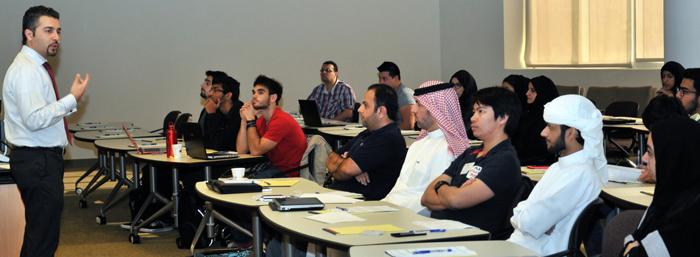- About
- Admissions
- Study at AUS
- Prospective Students
- Bachelor's Degrees
- Master's Degrees
- Doctoral Degrees
- Admission Publications
- International Students
- Contact Admissions
- Grants and Scholarships
- Sponsorship Liaison Services
- Testing Center
- New Student Guide
- File Completion
- New Student Orientation
- Payment Guide
- Executive Education
- Students with Disabilities
- Academics
- Life at AUS
- Research
- Contact Us
- Apply Now
- .

AUS holds a Cyber Security Boot Camp to expand awareness in computer and network security
American University of Sharjah, (AUS) began its Fourth Cyber Security Boot Camp yesterday, January 21, to help computer users learn about security awareness. The three-day camp, intended for general computer users, including students and professionals, who are looking to expand their knowledge in computer and network security, was conducted by Dr. Fadi Ahmed Aloul, the camp organizer and Associate Professor of Computer Science and Engineering at the AUS College of Engineering.
The idea behind the camp was to enable computer users to expand their awareness in computer and network security. Attendees at the camp learned about the latest cyber security threats and attacks they could face at home or the office, methods to protect themselves from being hacked and ways of dealing with being hacked. The boot camp included lectures, live demonstrations, real-world examples and interactive hands-on exercises.
Topics addressed in the boot camp included hacker types, goals, motivations and targets; challenges of securing information; password security and encryption; network security and viruses, worms and trojans; wireless and mobile security; social engineering and identity theft; web security and phishing attacks; physical security; email security and spam; social media security, and how to use the Internet safely.
"Hackers today are increasingly targeting the weakest link, the human, via various social engineering tactics," said Dr. Aloul. "Furthermore, the advances in technology and Internet today are making almost everyone carry a smartphone that works as a mini computer, that is always connected online, and stores lots of personal data including contacts, pictures, emails, passwords and files. Such smart devices are being used for work and personal activities, yet can be easily hacked if not used carefully. New intelligent threats are emerging every day against such users. Therefore, it is very important to 'continuously' educate any computer user on what are the latest threats and attacks and methods of protecting yourself."
Participating professionals included representatives from AUS, Thuraya, Telecommunications Regulatory Authority (TRA), Exponentia, Electrical Lighting Company, Dubai Maritime City Authority, Dubai Health Authority, Commercial Bank of Dubai, Abu Dhabi Police and Abu Dhabi Distribution Company.
Abu Dhabi Police Captain Nasser Al Dhaheri, who works in Abu Dhabi Police's IT sector, said that such camps are essential to his line of work because they "have to be up to date with new technologies."
"These workshops are very important. Even if they only last for two or three days, you will learn a lot," he remarked, adding that people must be aware from personal security breaches and learn how to protect themselves from hackers.
Echoing Captain Al Dhaheri's concerns for security, Taha Ozkul, a chemical engineering senior at AUS, said, "Security is an important factor in today's world; everyone uses electronics and smartphones, so we should learn how to be protective and take care of security threats."
"I joined this workshop because I want to learn how to protect myself and think it is interesting and personally helpful," he said. "Learning about cyber security is something everyone should do to self-improve."
All participants that completed the camp received certificates of attendance from AUS

